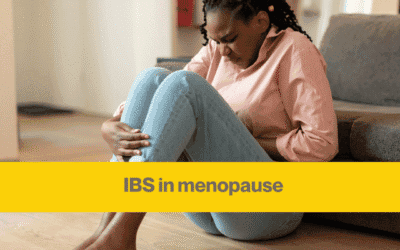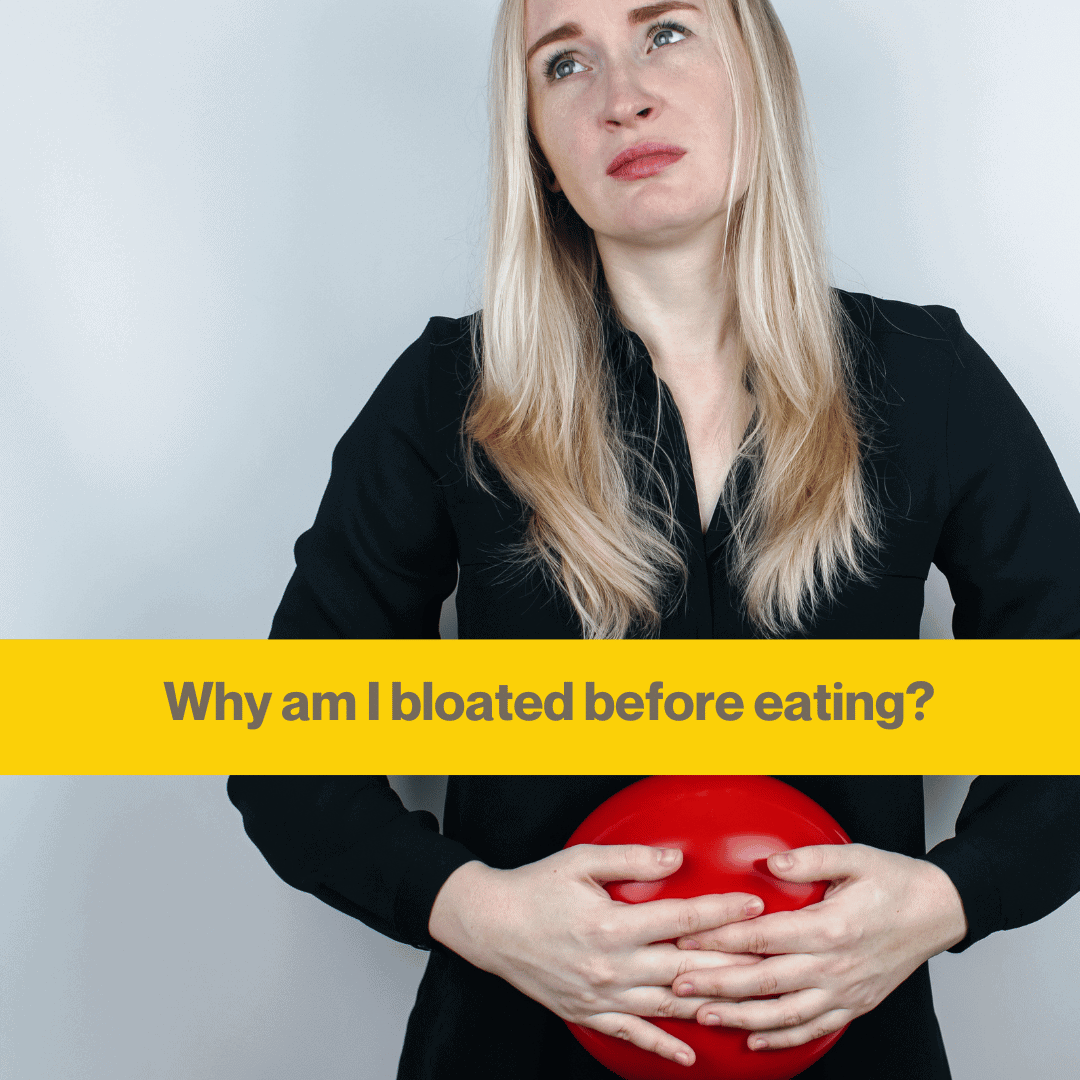Bloating – What’s causing it and how to feel better
Bloating is one of the most common symptoms my IBS and SIBO clients struggle with.
It’s also one of the hardest to hide.
You might look 5 months pregnant by the afternoon or have to undo your waistband just to get comfortable.
For some, the pressure even builds up into the chest and makes it hard to breathe deeply.
Does your bloating creep in slowly through the day, or do you feel full and swollen almost as soon as you eat?
That difference can tell us a lot about what’s going on in your gut.
NB: If your bloating is new or has suddenly worsened, always check in with your doctor first to rule out anything more serious.
When do you bloat?
The timing of your bloating could give you some clues about the causes
Bloating on an empty stomach
- Some people feel bloated when they think about food or get anxious about eating. The gut can react to stress before food even arrives.
- Gastritis can also cause bloating, pain and burning on an empty stomach.
- When you haven’t eaten the small intestine performs a cleaning wave (the migrating motor complex), which can also cause the gallbladder to contract. If bile flow is sluggish or the ducts are inflamed, this can feel uncomfortable under the ribs. An inflamed bile duct or gallstones might feel like sharp pains, bloating or a constant ache under the ribs.
Bloating during a meal or straight afterward
- Small intestine bloating, sometimes caused by SIBO
- Food intolerances (e.g. lactose, fructose)
- Low digestive enzymes, meaning food isn’t broken down properly
- Swallowing too much air (talking while eating, drinking fizzy drinks).
- Low stomach acid, eating too quickly or not chewing your food enough.
- Gastroparesis (slow stomach emptying) so food sits heavy for a long time.
- Eating very large, rich meals.
- Gallbladder issues if you feel worse after eating fatty meals.
1–2 hours after meals
- Food will start to pass into the small intestine, so fermentation here suggests malabsorption, SIBO, or enzyme insufficiency.
- Early signs of food intolerances.
Later in the day / evening
- Food intolerance, or a lack of stomach acid or digestive enzymes can lead to gas build up through the day. This is a typical IBS pattern.
- Constipation (not fully emptying bowels).
- Cumulative effect of meals and poor motility.
What bloating really feels like
Is this you?
- Mornings are mostly ok but by 5pm you’re bursting out of your clothes
- You avoid meals out because you can’t bear the bloat
- Some days you look in the mirror and feel six months pregnant
One client told me she had to take off her bra mid-afternoon because the swelling under her ribs made it unbearable. Another described heart palpitations from the pressure of bloating pushing up into her chest.
These experiences might sound extreme, but they’re more common than you think.

How food could be playing a role
Gas-producing foods are one of the most obvious triggers. That’s why the low FODMAP diet can be so effective — it removes the carbohydrates most likely to ferment and cause gas.
Bloating isn’t just about what you eat, it’s also about how your digestion is working. If food restriction alone hasn’t helped, it may be worth considering whether SIBO, constipation, or even stress are part of the picture.
If you’d like to dig deeper into SIBO, head over to my SIBO page
Do you have enough digestive ‘power’?
To break down food properly, you need:
- Stomach acid to start protein digestion and protect against microbes
- Digestive enzymes from the pancreas and small intestine to break down carbs, proteins, and fats
- Bile flow to digest fats and keep bacteria in check
These important digestive juices can be reduced by stress or ongoing anxiety, PPI medication, SIBO, or hormone changes.
I explain this more in my 3 month Gut Reset programme

Everyday habits that make bloating worse
Are you:
- Swallowing too much air when eating or drinking
- Eating too fast – big chunks of food are harder for your body to digest.
- Chewing gum or smoking
- Drinking with a straw
- Consuming fizzy drinks (anything with gas bubbles)
- Wearing tight waistbands
If you sit for long periods, shallow breathing and tight clothing can affect the diaphragm and abdominal wall tone, creating a bloated sensation even without much gas.
Persistent bloating unrelated to food or bowel changes can occasionally relate to gynaecological issues such as ovarian cysts or endometriosis.
Undereating & bloating
A lack of food in your digestive system can slow it down. This can make you feel more bloated, and if you’re underweight you might also notice a more visible change in the abdomen after eating a big meal.
Undereating is one of the most common causes of bloating that I see, and one that people don’t always believe at first because it might feel counterintuitive to eat more to beat bloating. When my clients eat a normal amount of food, with regular meals I have seen positive improvements in bloating.


Could constipation be the hidden culprit
If you’re not having daily bowel movements, or if your stools are hard, dry, or incomplete, food and bacteria can sit in the gut longer than they should, leading to bloating and discomfort.
Some people think they’re “not constipated” because they go every few days. In reality, this is one of the biggest drivers of bloating I see.
See how constipation and bloating are connected
What you can do next
❌ Myth: Bloating is just something I have to live with
✅ Reality: Once you understand the cause, you can expand your diet and start to get back to activities (and clothes) you love.
If bloating is holding you back from enjoying meals out, wearing what you want, or feeling comfortable in your own skin.
Explore other related symptoms:
Learn more about IBS and SIBO:
Take the next step:
Bloating in menopause: changing digestion & hormones
Part 3 - Bloating in Menopause If you’re in perimenopause or menopause and dealing with IBS, you...
Why do I feel bloated before eating
Most people with IBS and SIBO have come to expect bloating after eating, but for some, the...


